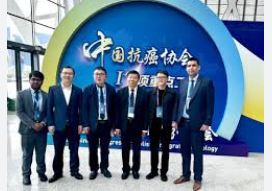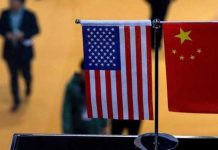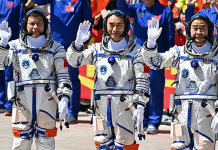BEIJING, NOV 10 (APP/DNA): The 2025 China Conference on Holistic Integrative Oncology (CCHIO), a monumental gathering in the global fight against cancer, has concluded in Kunming, leaving in its wake a powerful impetus for international collaboration and a renewed sense of hope in this transformative event, which stands as a testament to China’s visionary leadership in shaping the future of oncology.
CCHIO 2025 is more than a conference; it is a global movement. Uniting over 100,000 attendees, including a staggering 6,000 international experts from every corner of the globe, With over 300 scientific sessions spanning 200 oncology subspecialties, the conference served as a multidimensional academic platform where innovation was not just discussed but demonstrated.
This was stated by Dr. Muhammad Shahbaz, President of the China-Pakistan Medical Association (CPMA) in a statement.
He said that a key highlight, and a significant moment for Pakistan, was the reception of the Urdu-translated copy of the CACA (China Anti-Cancer Association) Guidelines for Cancer Treatment. These guidelines, now available in 16 languages, represent a monumental step in democratizing high-quality cancer care. For Pakistani clinicians, this translation is a gift a readily accessible, evidence-based roadmap that will standardize and elevate our clinical practices, directly benefiting patient outcomes across our nation. The conference provided an invaluable platform for strengthening the iron-clad friendship between Pakistan and China in the critical domain of healthcare.
Our discussions were substantive and forward-looking, centering on several key areas of cooperation: Leveraging Chinese advancements in genomics, early detection, and novel therapeutics to address the specific cancer profiles prevalent in Pakistan. Establishing exchange programs for Pakistani medical students and structured training fellowships for our doctors, surgeons, and nurses at prestigious Chinese institutions, he added.
Facilitating the transfer of cutting-edge cancer technologies, including state-of-the-art radiotherapy systems and AI-assisted diagnostic tools, to major hospitals in Pakistan.
Dr. Shahbaz also had meeting with Director of International cooperation of FDS consortium relative person incharge of KylinRay MELAC Linear Accelerator for advanced Radiation therapy machines and technology transfer to Pakistan. It will be cost effective and provide advanced radiation therapy to the cancer patients in Pakistan.
In a significant step towards institutionalizing this collaboration, he formally proposed a Sister University partnership between Kunming Medical University and Nishtar Medical University in Multan to the esteemed Dean, Dr. Zhu Youbao. Such a partnership would create a permanent channel for academic exchange, faculty development, and shared research projects, creating a legacy of knowledge that will benefit generations of medical professionals in both countries.
The spirit of the Belt and Road Initiative (BRI) was vividly alive in the conference halls. A particularly insightful meeting was with Dr. Mahruf, the focal person for the Belt & Road Healthcare Center, which is actively promoting China-Bangladesh medical tourism. This model presents a tremendous opportunity for Pakistan. Our doctors and healthcare professionals can use this established platform not only for patient referrals but, more importantly, for cooperation in advanced cancer care and technological innovation. By integrating into this “Health Silk Road,” Pakistan can position itself as a hub for high-quality, cost-effective medical care in the region, learning from and contributing to a growing network of excellence, according to Dr Shahbaz.
He said that the CCHIO 2025 has reinforced his conviction that the fight against cancer cannot be won in isolation. It demands the very integration, innovation, and international collaboration that this conference so powerfully embodies. China, through CACA and CCHIO, is not only leading by scientific example but is also generously extending a hand of partnership to the world. For Pakistan, the path forward is clear.
We must actively embrace these opportunities for collaboration, from adopting the CACA guidelines to fostering institutional ties and facilitating technology transfer. The seeds planted in Kunming in our meetings with university deans, hospital directors, and international colleagues have the potential to grow into a forest of progress for oncology care in Pakistan. Together, hand-in-hand with our Chinese healthcare professionals and leaders, we are forging a healthier, brighter, and shared future, free from the fear of cancer.

















